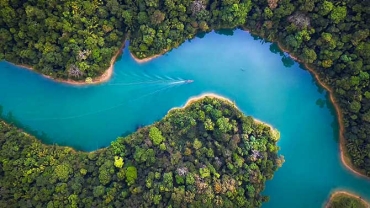
Louise Vet (Deltaplan Biodiversity Restoration) on the importance of biodiversity and COP15
The declining state of nature affects us all, including the future resilience of organisations that depend heavily on nature and biodiversity. At the UN Summit on Biodiversity (COP15), the world is gathering to make agreements and reverse this downward trend.
We asked our network of experts about the expectations and opportunities of this summit, because only together can we make progress. Today: Louise Vet, professor emeritus of evolutionary ecology at Wageningen University, advisor to the European Commission in the field of biodiversity and chair of the Deltaplan Biodiversity Restoration Foundation.

Louise Vet: 'Biodiversity is our engine room' | Photographer: Maartje Geels
In November, the world’s leaders gathered in Egypt to discuss climate change at COP27. Now everyone is gathering in Montreal, Canada, for COP15 and focusing on biodiversity. Why are there two different UN summits on two closely related topics? Do you find that remarkable?
'Definitely. Everyone is familiar with the UN climate panel IPCC. The reports they publish on the state of the climate are - finally - getting enormous attention. But there is also a UN panel on biodiversity, called IPBES. It is time the link between IPCC, IPBES and thus biodiversity is strengthened. I see this happening more and more at a high political level and hopefully this will continue at COP15.’
'Our common approach to climate change is sometimes at odds with biodiversity conservation. Like cutting down forests and trees for electricity. We then think that's a better alternative for CO2 reduction, but nothing could be further from the truth. If we continue to think from two silos - climate and biodiversity - the result of a measure from silo one is often at odds with the goal of a measure from silo two. Our focus should be on working with nature instead of against nature and so-called "nature-based solutions”. For example, reduce CO2 while preserving biodiversity by leaving forests as they are or planting new trees.'
It is therefore time to integrate our thinking and actions on climate and biodiversity. For now, the focus on climate is greater. Is that justified?
'The basis of it all is biodiversity. Without biodiversity there is no functioning ecosystem. And our planet runs on that. Biodiversity is our engine room.'
'There is a cartoon showing humanity is being threatened by large tidal waves. The smallest wave? Covid. Then recession and climate. The biggest wave engulfing all the others? The decline of our biodiversity. That drawing sums it up perfectly for me. Our goal of limiting global warming to one and a half degrees, for example, is unachievable if we don't start focusing on "nature-based solutions’’.’
'Throughout the production chain, companies are tremendously dependent on what nature provides.'
What does this mean for business?
‘Every company strives for continuity. That's currently just not always so obvious, because companies are tremendously dependent on what nature provides throughout the entire production chain.’
'I notice banks and insurers are increasingly realizing there is a link between climate and biodiversity. More and more banks are concerned about the decline of biodiversity and dependence on nature. Which companies are engaged in destruction of nature? Is your organization becoming a so-called "stranded asset," a worthless asset? Will investors still want to work with you? There is a huge financial risk for banks and insurers, and therefore for companies.’
So what questions should companies ask themselves now?
'We need to achieve transparency about our dependence on a natural ecosystem. This means that companies need to ask themselves: where does our organisation depend on nature? And: where is my dependence on nature in the entire chain?'
'So knowing the entire chain is an essential first step. Where does it come from and where does it go? Think of a beer brewer. Water is indispensable for the production process and water is scarce. Ideally, the brewer therefore feels responsible for clean drinking water. The knife then cuts both ways.'
Nature has a value that can also be expressed in euros. Is that what you mean?
'The World Bank released the report "Economic Case for Nature" in 2021. In it, the bank focuses on the value of nature. If we protect nature, what is the economic gain? It turns out that by 2030 the economic damage from nature loss will reach $2.7 trillion a year. This simply means that we can prevent economic damage by better protecting our nature and thus calculate our benefit from nature.'
'Take a forest for example. Would a forest tree be worth as much as the yield from wooden planks that can be made from it? Or is this tree worth as much as conserving CO2, providing clean water and regulating the climate? To me, it seems like the latter one.'
'Currently, the problem is that businesses don't do anything about good intentions if they don't pay off financially. Our current value system produces private revenues, from which the company profits handsomely, and public costs that we all pay for. That really has to change.’
'It appears that the economic damage from nature loss will reach $2.7 trillion per year by 2030.'
In first draft, the Global Biodiversity Framework (GBF) has formulated four long-term goals for 2050 and over 20 sub-targets for 2030. These targets will be negotiated at COP15. One of the targets focuses on "30 by 30": to protect at least 30 percent of land and sea by 2030 and keep them from further degradation. What are your thoughts on this goal?
'It is very important that commitments are being made. There is still much to be achieved and done. In the Netherlands we are operating on a postage stamp in terms of space and have an incredible amount of livestock. The agricultural sector can still do a lot to incorporate nature into its business strategy.'
‘Forty percent of our agricultural lands have completely degenerated due to overly extensive use. We point our finger towards Brazil, which has cleared about 95 percent of the Amazon Rainforest for grazing cattle or fodder production. We do not allow Brazil to do what we ourselves have done for a long time.’
'Where will we find the land to produce our own food? Think of soybean production. More than three-quarters of the world's soy production now gets used for feeding livestock for meat and dairy production. To me it is clear: for our own survival we have to adopt a different consumption pattern and change our system.'
There is so much coming towards everyone that it can feel overwhelming. Responsibilities are piling up and the need for change for future resilience is great. What would your advice be to our clients?
'Don't become a dinosaur. Look for opportunities and dare to innovate. To me, Costa Rica is a great example. Once upon a time, McDonalds cattle were grazing the land out there. Until policies were put in place to stop deforestation, the waters were used for hydropower, the forests remained and the cattle left the country. Now Costa Rica is the great example of a thriving and biodiverse ecosystem, which, especially with the popularity of eco-tourism, has benefited everyone.'
'The fear currently is, that we only hear what is not allowed and or possible. But please turn it around. Create short- and long-term opportunities by taking risks. There is no innovation without risk. So above all, don't cling to old thinking, but turn the ship around now. The decline of biodiversity is a profit warning. A serious one.’




















